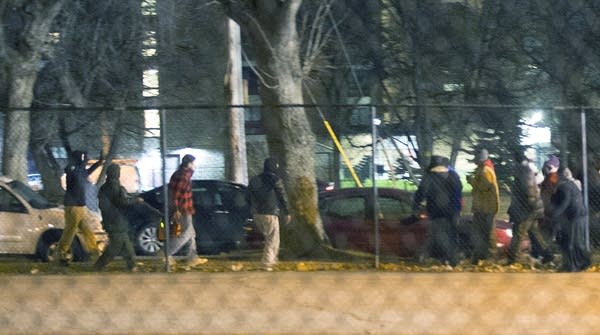Scarsella juror: I didn't buy self-defense shooting claim

Go Deeper.
Create an account or log in to save stories.
Like this?
Thanks for liking this story! We have added it to a list of your favorite stories.
A juror who helped convict Allen Scarsella of shooting five black men at a 2015 Jamar Clark protest says she didn't believe Scarsella's story that he shot the men because he feared for his life.
"The defense witnesses, except for the police, were lying through their teeth," juror Eileen Parker told MPR News. The jury deliberated for about seven hours before it returned 12 guilty verdicts against Scarsella.
Parker said by the time she got back to the jury room, she'd already made up her mind.
Testimony by Scarsella and one of the men with him that night in north Minneapolis, Nathan Gustavsson, sounded too well-rehearsed, said Parker. She believed the five men shot by Scarsella were telling the truth, she added, because their stories differed in small ways but still sounded plausible.
Turn Up Your Support
MPR News helps you turn down the noise and build shared understanding. Turn up your support for this public resource and keep trusted journalism accessible to all.

The jury turned aside arguments that the 24-year-old Bloomington man shot in self-defense as he and other companions were pursued by men attending a Clark protest near the 4th Precinct police station in north Minneapolis on Nov. 23, 2015. Clark, a black man, had been shot in a confrontation with Minneapolis police the prior week.
Prosecutors, however, said it was hatred of African-Americans that led him to pull the trigger and that Scarsella and three other men had gone to the encampment to cause trouble.
On the stand, Scarsella said he and Gustavsson were assaulted by protesters and that one of them brandished a knife or a shiny metal object. However, no weapons were found on any of the victims.
Parker said Scarsella must have thought the jury would see it his way.
"I know Scarsella's face when he was found guilty. He tried to not show anything," Parker recalled. "I think he looked really surprised, like, 'Oh, wow. I thought I'd get off of this like George Zimmerman did.' But no. This is Minnesota."
George Zimmerman shot and killed 17-year-old Trayvon Martin in Florida in 2012. Like Scarsella, Zimmerman claimed that he fired his gun in self-defense. However, Florida has what is commonly referred to as a "stand your ground" law, which allows people who could have avoided confrontation to still claim self-defense. Zimmerman did not cite "stand your ground" during his trial.
Minnesota law is different, said Fred Goetz, an attorney who has defended clients in several high profile criminal trials.
"If you're on the street — in other words, not in your home — and you can retreat, you have a duty to do so," he said, adding that to claim self-defense, a person also has to demonstrate that their use of force was a reasonable response to the situation.
Parker said she believed Scarsella knew what to expect at the protest and that it would give him the opportunity to shoot black people, something he'd written about in text messages in the preceding months.
One message read during closing arguments refers to black people as chimps. The message said that by putting the stars and bars of the Confederate flag on a gun he could "tempt a chimp to chimp out, so you can shoot them."
Comments like those were shared with friends who would know not to take them seriously, Scarsella said, adding he'd seen derogatory terms like that on a website.
Attempts to contact other jurors for comment were unsuccessful. The names of jurors are not made public. Hennepin County Attorney Mike Freeman has said he expects Scarsella will be sentenced in March to 12 to 17 years in prison.
Parker, who is white and was raised in Canada, said she wasn't exposed to racial tensions in America until she was an adult, and hearing racial slurs in court made her jaw drop.
"All of us were really surprised that people like Scarsella exist," she said. "We didn't know about websites like that were people had their little white supremacist rantings and stuff."
Some observers didn't expect a predominantly white jury to convict Scarsella, who's white.
Minneapolis NAACP President Jason Sole co-wrote a commentary recently published in the Minneapolis Star Tribune raising questions about implicit bias in white jurors. Sole, who also teaches criminal justice at Hamline University says the verdict caught him off guard.
"We're not accustomed to seeing justice take course," Sole said. "So, I'm also expecting the worst. Hoping for the best but, I just don't have faith in the system."
Parker said the jury members saw themselves as being impartial and fair, adding, "I believe justice was done."
Editor's note (Feb. 9, 2017): This story has been updated to clarify that George Zimmerman did not cite the "stand your ground" law during his trial.


